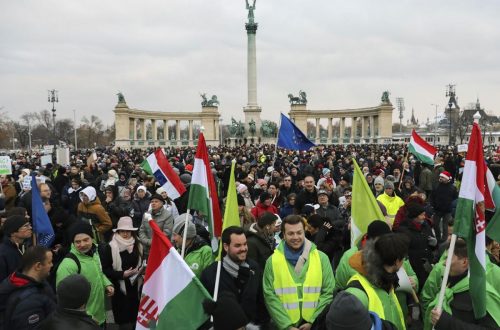This is a cross post by Terry Glavin
Imprisoned for the past two years in Tehran, Hossein Derakshan, a Canadian citizen, is now said to be facing execution. The self-described “Iranian blogfather” was arrested in November, 2008 on charges of collaborating with enemy states, insulting the Khomeinist religion, and making propaganda against the regime and for “anti-revolutionary” groups. The CBC reportsthat the death penalty is now what the prosecutor in Derakhshan’s case has recommended.
The CBC might have at least placed the term “anti-revolutionary” in parentheses, because to fail to do so is to accept the Khomeinist inversion of reality – the Tehran regime is in fact counter-revolutionary; it culminates the betrayal and sabotage of the 1979 Iranian revolution – and what it calls “anti-revolutionary” includes a whole range of activity that is revolutionary and reformist, and can include the most modest forms of dissent, laughing at the government, and listening to rock and roll music. This is not a mere detail.
More pertinent is a fact unreported by the CBC, to which the Montreal Gazette account only alludes in the most opaque way. The Gazette notes that Iranian bloggers who have come to Derakhshan’s defence concede that he has “been a source of contention” and his conduct has “forced many in the blogosphere to distance themselves from him.” The Iranian bloggers nonetheless allow that this should make no difference to the cause of free speech upon which they rest their just demands for Derakshan’s release. And quite right, too.
It is also quite right that PEN Canada and Canadian Journalists For Free Expression have taken up Derakshan’s case. I suppose you could even go so far as to take heart that Canada’s Foreign Affairs Department is at least engaging in the usual rituals of “contact with Iranian authorities” and composing diplomatic notes and proposing “high-level meetings” and seeking “consular access” and continuing with its pro-forma utterings that urge Iran to discharge its human rights obligations and so on.
But one has to wonder why these ceremonies of outrage proceed in these ways. As they unfold, nobody notices that Canada and the United States continue to criminalize the Iranian revolutionary movement while at the same time we allow the agents of Khomeinist counter-revolutionary terror to remain at large. It makes me wonder, anyway, and my own hunch is that this upside-down state of affairs might have has something to do with the elisions and occlusions of “mere detail” of the sort I noticed in the CBC account of Derakhshan’s latest predicament.
Another mere detail: It wasn’t that long ago that Samira Mohyeddin wondered aloud about why agents of the Khomeinist regime were honoured guests at a University of Toronto event, and it was none other than Hossein Derekhshan who turned to her and asked: “Do you have to make this political?”
The last time we heard from Derakhshan, he was writing polemics in defence of Mahmoud Ahmadinejad and slagging off international human-rights NGOs for coming to the aid of imprisoned Iranian trade unionists and intellectuals. This was after he’d made a spectacle of himself by traducing the Canadian philosopher Ramin Jahanbegloo, who was himself imprisoned by the Khomeinist regime. I realize it’s difficult to keep track of all this. I highly recommend Danny Postel’s handy guide to that rumpus, in which Postel usefully invokes Milan Kundera’s The Unbearable Lightness of Being.
The last time I personally heard from Derakhshan, he was upset with me for noticing that he appeared to have been employing his computer hacking skills to divulge to the Khomeinists the identity of the Iranian-Canadian free-speech fighter Arash Abadpour (who until then went by the name Arash Kamangir), thus putting Abadpour and his family at great risk, all in the cause of assisting some of the most reactionary ayatollahs in the Iranian parliament. Once exposed, Derakhshan then resorted to that same technical savvy to cover his tracks by a method that Abadpour showed to be a pretty lame effort, at that.
Derakhshan’s current calamity is probably more sensibly understood as a case of an eccentric and self-regarding denizen of Iran’s ruling class who has fallen victim to its vicious and byzantine internicine struggles. By his blog-post interventions, Derakhshan had already fallen afoul of the clique of Ayatollah Rafsanjani, which has recently gone so far as to secure an edict forbidding the Iranian press from even mentioning the names of its rival clique’s leaders. It is in that clique which has lately fallen into such official disfavour that Derakhshan is more accurately placed, rather than in the broad class of Iranian prisoners of conscience, which is where we are now called to situate him.
But fair play to Hossein Derakhshan, because he is no less entitled to freedom than you are. And fair play to Arash Abadpour, whose name appears first on the petition by Iranian dissidents protesting Derakshshan’s initial arrest (that should tell you something about the sturdiness of Abadpour’s character).
And thus it is right and just that the approved responsory chant in your hymnals is “Free Hossein Derakhshan.” I might also point out that in today’s readings we are also called to turn our thoughts to Iranian reporters Shiva Nazar Ahari andEmadeddin Baghi, who were each sentenced earlier this week to six years in prison, joining at least 37 journalists in Iranian dungeons.
“Do you have to make this political?” Yes, actually, because otherwise we just allow the ritual catharsis of protest to unfold without harm to tyrants, and we remain on our knees when we should be standing up and asking aloud: When are we going to start getting serious about Iran?


